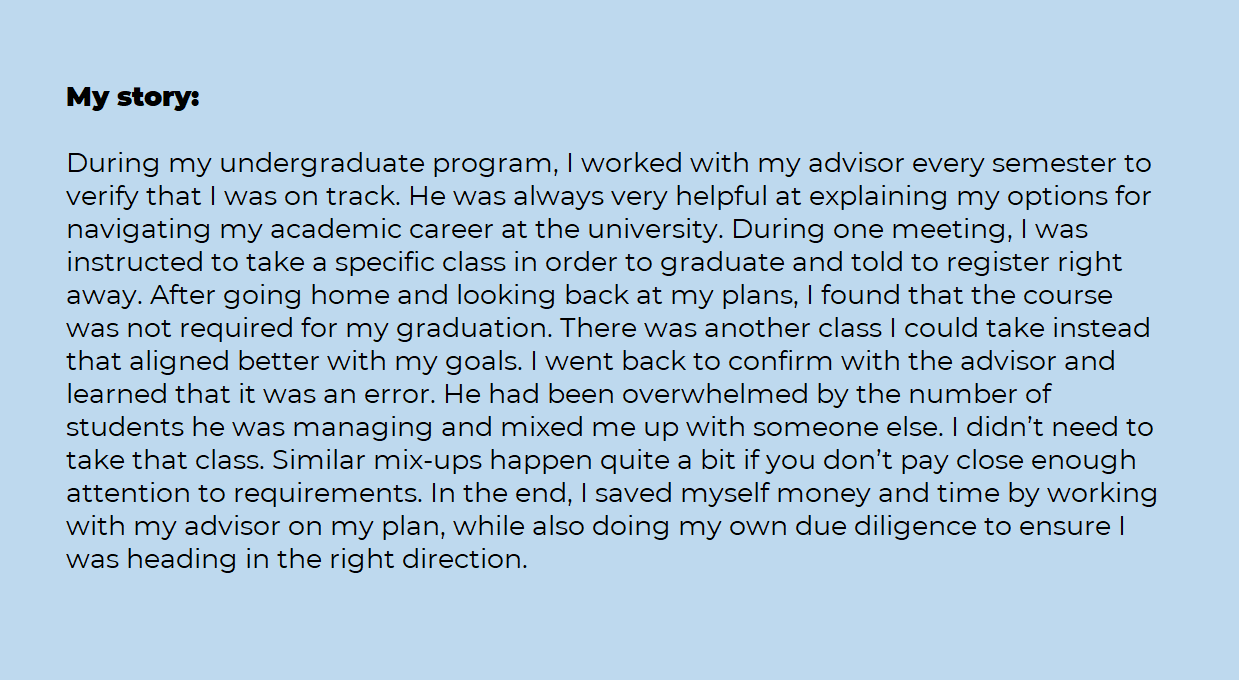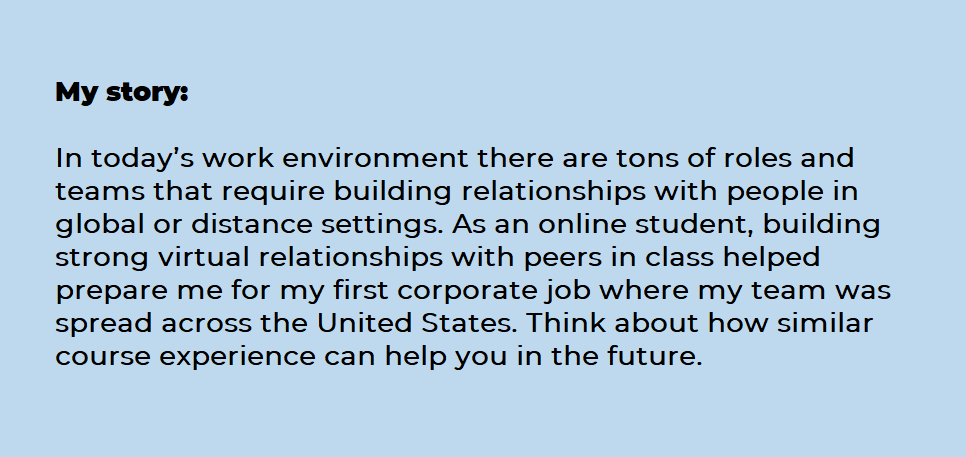Build your support system
Hate the thought of needing support? You aren’t alone. Many people go to school to establish or solidify their independence, and simultaneously thinking about whom you should lean on for support can seem counterintuitive. Nevertheless, understanding your strengths and areas where you can use some support to grow can help make your journey to independence more seamless. Building a support system is a lot like building a sports team in which you are the star athlete. There’s a common saying:
“A coach talks to you, a mentor talks with you, and a sponsor talks about you.”
Further, your teammates can learn with you and help you practice. The same applies to academia. Here is an overview of what each of these roles is, why they are essential, and where you can find them for school.
Coaches
Coaches teach you what you need to know to pass your classes. Coaches talk to you. These are typically your professors and instructors who teach you the tactical skills that you need to succeed in a particular class. They teach you new game plans in the form of course lectures and lessons. They give you feedback in the form of grades and comments. They prepare you to play in the games that lead up to the championship or final exam. Their job is to help you reach a simple goal: to demonstrate that you’ve learned enough to pass the class. While passing your class is important, the most successful students focus on more than just the grade. It can help to learn from your instructor’s experience in the industry and gain tips for navigating your own personal and professional career. Be sure to connect proactively, find common ground, develop the relationship, and create a space where you can come with questions about class and beyond.  Pro Tip: Don’t wait until you don’t understand a concept or have a tough question to reach out. Your professor is there to support you throughout the course. Reach out during the first week of class and try scheduling an introductory call or take advantage of any virtual office hours.
Pro Tip: Don’t wait until you don’t understand a concept or have a tough question to reach out. Your professor is there to support you throughout the course. Reach out during the first week of class and try scheduling an introductory call or take advantage of any virtual office hours.
Mentors
Mentors seek to understand your goals and challenges and help you navigate them. Mentors talk with you. These are typically your counselors or advisors that seek to understand who you are, what your goals are, and what you hope to accomplish. They can then guide you through tough academic or career choices in alignment with your long term goals. Just because there isn’t a physical counselor’s office in an online setting doesn’t mean you don’t have access to one. Take some time to understand what kind of advising and support services your school offers for online students. Some schools have elaborate online counseling platforms where you can meet with counselors over video, ask questions, track academic progress, ask questions and more. Take full advantage of these services. Remember that your counselor is there to support you, but owning completion of your goals and tracking progress are your responsibilities. Seek to understand what classes you need to take in order to graduate and be sure to track your progress personally. Self-tracking and accountability will enable you to trust recommendations, but also verify advice that you may get regarding your academic career.  Pro Tip: Ensure your counselor understands your mission, goals, and the challenges you are facing so that they can help guide you through it. Also, agree to a regular check-in schedule that you can look forward to. At minimum, aim for at least once every semester or quarter.
Pro Tip: Ensure your counselor understands your mission, goals, and the challenges you are facing so that they can help guide you through it. Also, agree to a regular check-in schedule that you can look forward to. At minimum, aim for at least once every semester or quarter.
Sponsors
Sponsors help connect you to opportunities. Sponsors talk about you when you aren’t in the room – in a good way. In a school setting, these are people who can help get your name out there, especially if you are looking for a job. For example, companies often work with schools to recruit prospective interns or new full time hires. When they do, you’re more likely to get recommended for those opportunities when you have sponsors in the right places. Depending on your goals, build relationships with people who can positively impact them even when you are not around.  Pro Tip: Remember that people you build strong relationships with online can still vouch for you, act as references, or provide recommendation letters. In the previous examples, my professor and my career service connection both became very valuable sponsors after I graduated.
Pro Tip: Remember that people you build strong relationships with online can still vouch for you, act as references, or provide recommendation letters. In the previous examples, my professor and my career service connection both became very valuable sponsors after I graduated.
Teammates
Teammates help you practice and learn. Teammates learn with you. These are typically your peers or students in your classes that you can connect with to study, share ideas, and more. They are playing in the game with you, and you have common goals which make connecting and relating easier. Get creative in organizing student group chats and other ways to talk with classmates. Building these relationships and working together can help you avoid procrastination, get practice with distance collaboration, engage in some healthy grade competition, and gain exposure to new ways of thinking.  Pro Tip: Try starting a virtual study group with a few students.
Pro Tip: Try starting a virtual study group with a few students.
Maintaining Relationships
Maintain the relationships for the long haul.
Good relationships can’t be forced, and they take time to develop. Build relationships early on and maintain them throughout your academic career. Don’t just reach out when you are drowning and in trouble. Drop random notes to say hello and check in every once in a while or set up recurring meetings. Also, seek to understand preferred communication channels and don’t limit communication to standard mediums. You can leverage text, email, online learning platform discussion boards, Skype, phone calls and more to get to know your support system. Consider all options and select what works best for both parties.
Pick people strategically.
Before even trying to fill these roles, it may help to think about your goals, strengths, and weaknesses in order to identify supporters who can complement those. For example, if you know you aren’t that great at goal setting yet, you may want to focus on identifying a mentor who has experience with goal setting and can guide you through the process. Another example is if you know that of the four classes you are taking, one will be the most valuable in preparing you for your desired career you may choose to focus on getting more coaching from that professor over others. Note that this does not have to be a formal process or team where you send invitations or sign people up to join your support system. It’s merely a way to understand what support you have and how you can leverage it. The way you manage it can be as formal or informal as you’d like. Some people may want to formally ask an advisor to mentor them, while other students may be fine with just developing the relationship and asking questions from time to time. Either scenario is fine as long as you focus on building a stable relationship with the right people.
Other support resources
If you are struggling to find coaches, mentors, sponsors in an online learning setting, all is not lost. There are virtual support services that can be leveraged no matter where you are or what your school is offering. For example, an organization called Bettermynd focuses on improving the mental health of students by providing virtual counseling services. PrestoExperts offers similar services for students and beyond. Before opting for an independent provider, be sure to look into what your school already provides. Related services may be included as a part of your tuition package.
Conclusion
Getting support from your newly developed system of coaches, mentors, sponsors, and teammates can reduce stress and increase your chances of winning the championship of online schooling. Be sure to leverage your coaches, also known as professors, to learn as much as you can in your program. Leverage your mentors, also known as counselors, to navigate critical decisions, overcome challenges, and plan for the successful completion of your program. Know who your sponsors are and empower them to talk about you and connect you with opportunities even when you aren’t in the room. Work with your teammates, also known as peer students, to learn and grow together. You are on the same journey and are likely experiencing similar challenges that you can work through together. Though you are out of sight, make sure you are still in mind by remaining in contact with everyone you’ve identified as a part of your support system. Lastly, get familiar with independent virtual support offerings that can fill any gaps your system may have beyond what’s available through the school. With the right support team, you can up your chances of achieving your ultimate goal and completing your online degree program.





